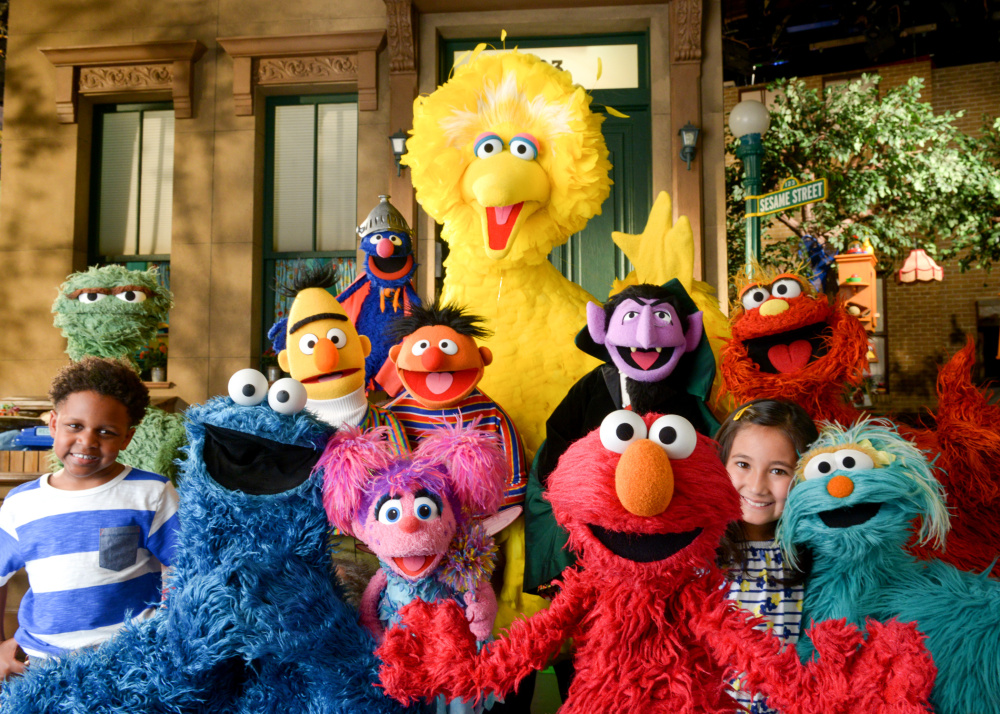The iconic Muppets of “Sesame Street,” who spent the past 45 years on PBS, will reveal a host of modern touches when they debut Saturday morning at their new home on HBO. Elmo will move into a brownstone, the Cookie Monster will team up with some tablet-wielding crime fighters, and Oscar the Grouch will pop out of not just trash cans, but recycling and compost bins, too.
Yet the biggest changes for America’s best-known children’s series are much subtler – and riskier – than can be seen on set at 123 Sesame Street: Shorter episodes, fewer characters and a sharper focus on winning the attention of millions of preschoolers who don’t get the show turned on for them, but choose it themselves, via a phone or tablet app.
A lot has changed since the psychedelic “Sesame Street” first hit family living rooms in 1969, becoming a mainstay of public television and ushering in an age of “nutritious entertainment.”
So as the battle for kids’ attention heats up, the American classic is having to become a different beast: Redesigned, relentlessly field-tested and repositioned to win that increasingly lucrative market, the media-drenched toddler of 2016.
“It’s a very competitive marketplace … and it really is the kids now who are making the decisions,” said Carol-Lynn Parente, the show’s executive producer. ” ‘Sesame’ is the most-tested show in the history of television. We’re trying to diagnose what makes these kids tick.”
“Sesame Street’s” 46th season will be its first to premiere behind HBO’s premium-cable paywall, where episodes will run exclusively for nine months before they’re made available on PBS.
It will also be the first to fully break with its longstanding hour-long format and shrink to 30 minutes, to keep kids with other media vying for their attention focused and engaged. That half hour will also be newly focused on a single backbone topic – a departure from the hour-long “Sesame,” which could flit between Elmo’s songs, the central “Street story” and “Abby’s Flying Fairy School” in a squeaking blur.
Where recent series focused on STEM skills and childhood obesity – most notably, with Michelle Obama joining Big Bird in the White House kitchen in 2013 – new shows will focus on lofty goals like teaching kids “self-regulation” and “executive function”; in other words, handling challenges without having a meltdown.
Leading the curriculum will be the insatiable Cookie Monster: As “Sesame” spokeswoman Alicia Durand said, “He’s the poster child for self-regulation skills, because he has none.”
“Sesame” will still teach the basics: The vampiric Count von Count will still count, and kids will still be taught a “Letter of the Day”: In the first new episode, “Black-ish” actor Tracee Ellis Ross will teach the letter “B” while in bed with Boodles, her stuffed beagle.
But more and more, the episodes will focus on scenarios that children born in the Internet age will no doubt confront. One recent episode involves Elmo and Abby scheming to get a character to stop staring at her phone.
“Sesame’s” five-year contract with HBO, announced in August, was a lifeboat for Sesame Workshop, the show’s nonprofit, which lost $11 million in 2014 largely because of plunging sales of DVDs, its biggest moneymaker. But the deal, whose financial terms weren’t disclosed, was also a crucial win for HBO, the not-so-family-friendly cable empire looking to boost its appeal in kids’ entertainment.
The unexpected marriage also fueled a major backlash. For critics, the premium-cable giant’s swallowing of a children’s show designed to deliver free education to underprivileged kids was, as comedian Brian Gaar tweeted, like “privatizing a national treasure.”
Others bemoaned that Elmo would soon share the same airwaves as grittier shows like “Game of Thrones.” Parents Television Council president Tim Winter said that “Sesame”-charmed parents would be forced to “subscribe to the most sexually explicit, most graphically violent television network in America.”
The producers feel the pressure with every change to the American classic, and they’re expecting this season to face more inspection than ever. Johnson, the creative director, called it exciting but “kind of terrifying.”
“There’s always a danger that one of the changes will alienate people,” said Parente, the executive producer. “It’s something other properties don’t have to deal with: the deep emotions of this brand … the challenge to stay relevant, and to stay important to preschoolers, too.”
Copy the Story LinkSend questions/comments to the editors.




Success. Please wait for the page to reload. If the page does not reload within 5 seconds, please refresh the page.
Enter your email and password to access comments.
Hi, to comment on stories you must . This profile is in addition to your subscription and website login.
Already have a commenting profile? .
Invalid username/password.
Please check your email to confirm and complete your registration.
Only subscribers are eligible to post comments. Please subscribe or login first for digital access. Here’s why.
Use the form below to reset your password. When you've submitted your account email, we will send an email with a reset code.